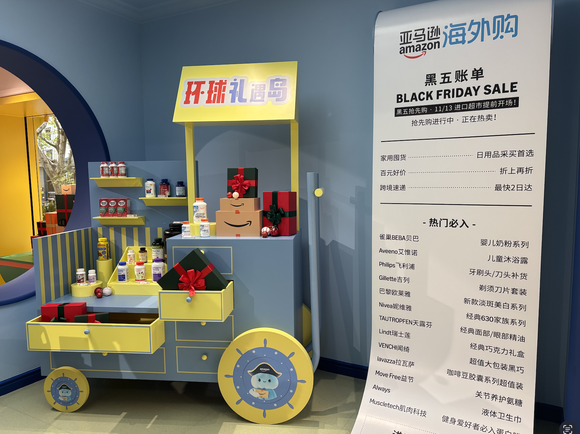China's ultrafast logistics and livestream commerce leave Amazon facing steep localization challenges.

Photo from Amazon
by CHENG Lu
Amazon is making a fresh attempt to regain relevance in China's e-commerce market, rolling out a curated-import strategy as local rivals tighten their grip on consumers.
The company opened a pop-up store in Shanghai over the weekend, displaying outdoor gear, beauty products and small appliances to promote Amazon Global Store, its cross-border shopping service. The move came ahead of its Black Friday sale running Nov 20–Dec 2, covering 35 categories, 30,000 brands and more than 3 million items.

China is the world's largest e-commerce market, dominated by Alibaba's Tmall, JD.com and ByteDance's Douyin, whose near-instant logistics and livestream shopping have set high service expectations. Amazon exited its China marketplace in 2019 and shifted to cross-border imports, but competition in that segment has also intensified.
LI Yanchuan, head of Amazon Global Store Asia-Pacific, told Jiemian News the company is focusing on product uniqueness and transparent final pricing rather than joining heavy discounting campaigns. He said consumers can now see tax-inclusive and shipping-inclusive prices at checkout, and orders from Amazon's Ningbo bonded warehouse can arrive in as little as two days through SF Express.
Amazon has expanded its China presence with an app, a WeChat Mini Program and a flagship store on JD.com, which has become a top performer in JD's imported-goods business. The Shanghai pop-up is aimed at boosting offline visibility and attracting younger shoppers.
The company is also using global data to track micro-trends and introduce overseas hits more quickly. Items such as Owala tumblers and Ninja kitchen appliances, popular on social media abroad, have seen rising interest among Chinese buyers.
But Amazon faces entrenched local habits. Chinese shoppers are accustomed to fast delivery, heavy promotions and livestream recommendations. Influencers on Xiaohongshu—including celebrity Zhang Xiaohui—have driven interest in brands like MY.ORGANICS and Gotukola, adding pressure on foreign platforms to keep pace.
Local rivals are stepping up recruitment of niche overseas labels and expanding supply-chain networks in Europe, Japan and South Korea, tightening competition for Amazon in a market where domestic players hold structural advantages. Whether Amazon's niche strategy can gain traction remains unclear, as curated assortments and simpler pricing have yet to shift its position against far more deeply integrated rivals.